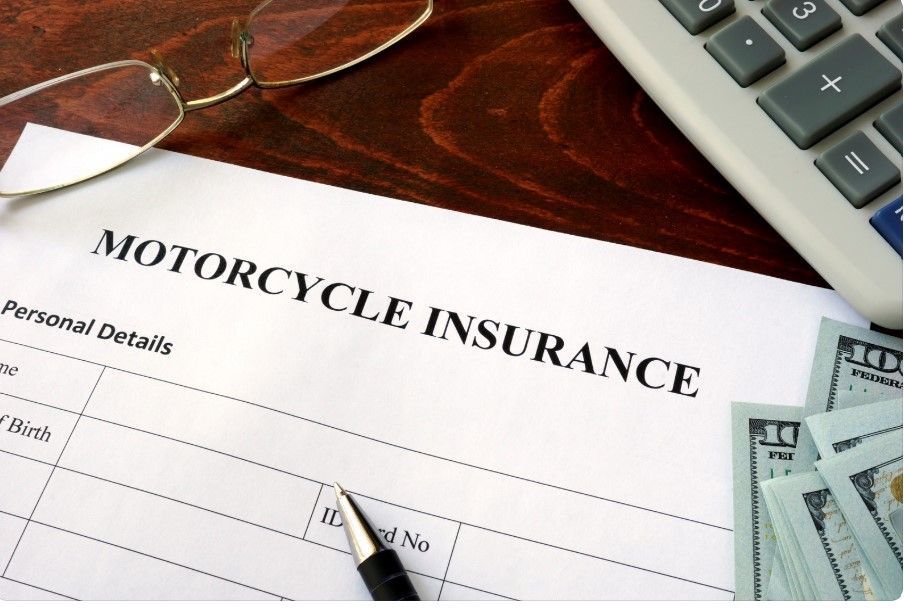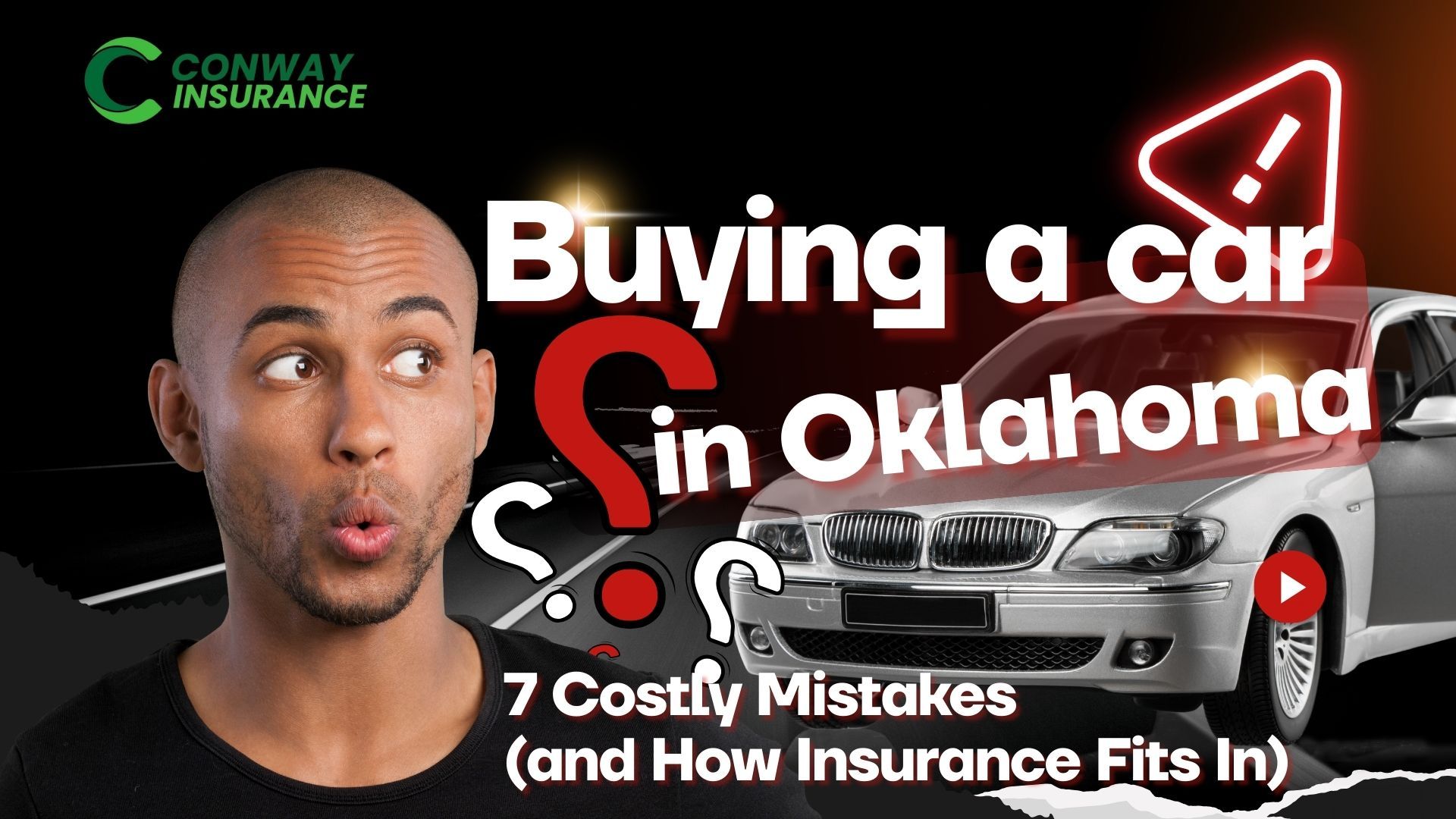Feel the Wind and Freedom of owning a Motorcycle
Steven Conway • December 15, 2024
Feel the Wind and Freedom of owning a Motorcycle

A motorcycle insured in Oklahoma must be kept in good working order to avoid accidents
Oklahoma motorcycle riding can be thrilling and rewarding, but it is not without risk. It is easy to get caught up in the state's wide-open roads and scenic routes when you take a ride along them. A good motorcycle insurance policy, proper maintenance, and safe riding can reduce your chances of getting into accidents and financial burdens.
Safety and insurance for motorcycles
The ability to protect you in the event of an accident is an important feature of motorcycle insurance. According to the Oklahoma Highway Safety Office, nearly 60% of motorcycle crashes resulted in injury or death.
A motorcycle accident is 29 times more likely to result in death than a road accident involving a passenger vehicle, according to the National Highway Traffic Safety Administration. It is imperative that proper safety precautions be taken considering statistics like these.
One should always wear a helmet. It is not just a good idea for safety but is also required by law in Oklahoma and most States of the United State if not all of them. It is always a good idea to choose one with a good safety rating.
Other safety apparel should not be neglected either. A motorcycle rider should consider clothing and gear that reduces road rash, impact protection to minimize broken bones and internal injuries, increases visibility, and weather protection.
Don't speed or drive recklessly: Speeding and reckless driving increases your chances of getting into an accident. To stay safe, follow all road rules.
Motorcycle Maintenance: Preventing Mechanical Failures
Maintaining your motorcycle properly is essential to avoiding mechanical failure-related accidents. Focus on these things:
• Make sure that your tires are properly inflated and treaded to prevent slipping and blowouts.
The front and rear brakes should be inspected for wear. A brake pad should be replaced when it begins to thin.
• Check that your headlights, taillights, and turn signals are working properly, especially at night.
• Ensure smooth and safe operation by regularly checking oil levels, engine coolant, and brake fluid.
Maintenance, especially before and after long trips, can prevent accidents caused by avoidable breakdowns and mechanical failures.
How Motorcycle Insurance Protects You
Just like an automobile owner, motorcycle owners are required to carry a minimum amount of liability coverage, but this is often insufficient to cover the costs associated with motorcycle accidents. A motorcycle accident can cause a great deal of damage and if you have just state minimum liability insurance, you may be covering damage not just to your motorcycle out of your own pocket but also any injuries you sustain.
It is estimated that a motorcycle accident can result in a significant amount of bodily injury. U.S. motorcycle bodily injury claims average more than $25,000, according to the Insurance Information Institute (III). Damages to your motorcycle or property are not included in this calculation. Having adequate insurance can protect you financially if the unexpected happens.
Here are some types of motorcycle insurance you should consider:
• Liability Insurance: Covers you if you damage property or cause injury to someone else.
• Comprehensive and Collision Insurance: These cover damages to your motorcycle in event of an accident (regardless of fault), theft, hail damage, and other perils.
• Uninsured/Underinsured Motorist Insurance: Covers injuries and other bodily injury damages you incur if you are hit by an uninsured or underinsured driver and the other driver is at fault.
• Medical Payment: Covers medical payments in event of an accident regardless of fault.
Invest in the right coverage
Motorcycle accidents are more common than many people realize, and their consequences can be severe. Maintaining your bike, having the right insurance coverage, and practicing safe riding habits are all key steps in protecting yourself on the road. Invest in comprehensive coverage today to enjoy peace of mind on every ride.
Please note that the information provided in this article is intended for general informational purposes only and may not apply to your specific situation. Insurance laws and regulations can vary significantly from state to state, and it’s crucial to understand the specific requirements and coverages that apply to your location. We strongly recommend consulting with a licensed insurance agent in your state to discuss your unique needs and ensure you have the appropriate coverage for your circumstances.
Recent posts

Auto insurance discounts can feel like Bigfoot — everyone talks about them, and if you’ve spent time in Broken Bow or Hochatown, you know some folks swear they’ve seen one. But actually finding a discount that applies to you? That’s another story. At Conway Insurance, we help Oklahomans cut through the gimmicks and find the discounts that are real, practical, and can actually lower your bill. Whether you’re in Oklahoma City, Edmond, Norman, Midwest City, Tulsa, or down in Broken Bow, here’s what you need to know about saving money without sacrificing protection. If you’re looking for affordable auto insurance in Oklahoma without cutting corners, you’re in the right place. TL;DR – Quick Guide to Oklahoma Auto Insurance Discounts Looking for affordable auto insurance in Oklahoma without cutting coverage? Here are the biggest ways Oklahomans save: 🎓 Good Student – Teens/college drivers with B average or better. 🚗 Multi-Car & Multi-Policy – Biggest savings for families, bundles, or renters + auto. 📱 Safe Driver / Telematics – Drive safely, get rewarded (Progressive Snapshot, GEICO DriveEasy). 💻 Auto-Draft & Paperless – Small but easy savings for e-sign and autopay. 🛡️ Loyalty & Continuous Coverage – Stick with your carrier, avoid lapses, earn better pricing. 🏠 Bundle with Renters/Home – Even a small renters policy can drop your auto rates. 🎖️ Military Discounts – Available with carriers like GEICO for active, retired, Guard/Reserve. 🧾 Defensive Driving & Driver’s Ed – Great for teens, mature drivers, or ticket clean-up. ⚡ Bonus Discounts – Hybrid/EV, early renewal, prior carrier, professional group credits. 👉 Not all discounts apply to all drivers; eligibility varies by carrier and may change at renewal. We’ll shop Progressive, GEICO, Safeco, Mercury, NatGen, and more to find what fits you. Why Discounts Get Confusing Carriers love to advertise “up to 20% savings,” but here’s the fine print: not every discount applies to every driver. That’s why one person leaves smiling, while another wonders why their rate didn’t budge. And let’s be honest — it’s frustrating when you see ads promising huge savings, but your own quote barely changes. Sound familiar? As an independent agency, Conway Insurance shops Progressive, GEICO, and other trusted carriers to match you with the discounts you actually qualify for — no false promises.

You’ve driven up to a car dealership in Edmond, Norman, Tulsa, or one of the hundreds across Oklahoma for a test drive — fallen in love with the leather seats, the new-car smell, and the salesperson’s “today-only deal.” You’ve convinced yourself the monthly payment isn’t that bad. You know the look — that “today-only deal” grin. Then come the tag fees… and that insurance quote you didn’t see coming. Buying a car isn’t just about the test drive and financing; it’s about understanding the hidden costs that follow you home — like insurance. 🧾 TL;DR – Quick Guide 🚘 Buying a car in Oklahoma? Avoid these seven mistakes: ❌ Don’t skip VIN checks ❌ Don’t rely on minimum coverage 💬 Quote your insurance before signing 🛡️ Protect yourself with GAP and comprehensive coverage 📋 Review your policy afterward 🤝 Keep your agent in the loop — small details prevent big problems 🧭 Oklahoma Quick Facts • 13% of Oklahoma drivers are uninsured • State minimum liability: 25/50/25 — meaning $25,000 per person, $50,000 per accident for bodily injury, and $25,000 for property damage • Average new vehicle cost: $48,000 • Average Oklahoma tag & title fees: $300–$600 per vehicle 💡 Translation: A single crash involving a newer SUV could exceed the state’s minimum property-damage limit instantly.
